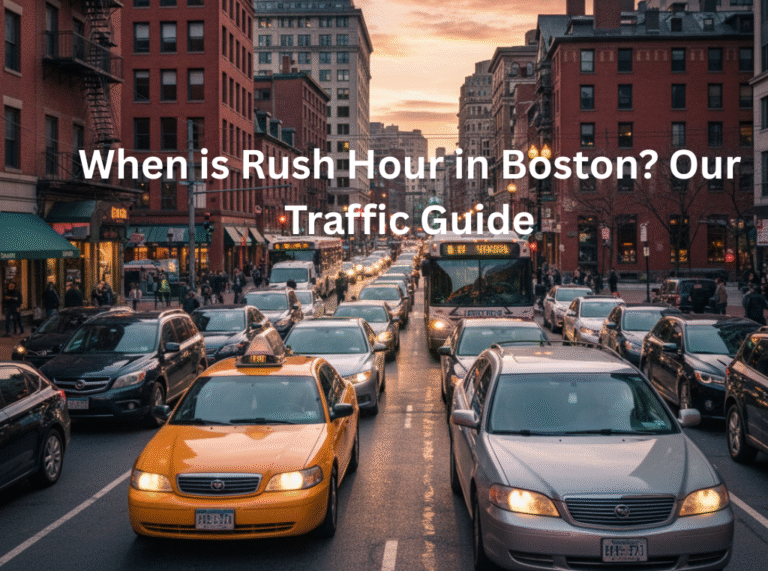You know that traffic in Boston can be unpredictable if you have ever driven through the city. Understanding Boston’s traffic patterns can save you time and reduce stress, whether you’re travelling to work, flying from Logan International Airport, or visiting attractions like Fenway Park and Boston Common.
This guide will help locals and tourists navigate Boston more effectively. It includes traffic app information, Boston rush hour times, and driving tips.
Why is Boston traffic so heavy?
Boston is consistently ranked among the most congested U.S. cities. According to INRIX Traffic Reports (Massachusetts Department of Transportation) and MassDOT, the city’s narrow historic roads, dense downtown, and heavy commuter populations all contribute to delays.
Congestion: What are the main causes?
- Boston’s historic road layout was never intended for modern traffic.
- Commuter inflow: Every day, thousands of workers from nearby cities, such as Cambridge, Somerville, and Quincy, travel.
- Attractions for tourists: high visitor traffic near landmarks such as the Freedom Trail and Faneuil Hall.
When is rush hour in Boston?
Rush hour in Boston follows typical urban patterns, but can vary slightly depending on the season and weather conditions. Everyone looks for what time does traffic start and when does rush hour end? So here’s the timeframe.
Morning Times of Rush Hour:
7:00 AM to 9:30 AM
Expect traffic congestion on major roads such as I-93, Storrow Drive, Massachusetts Turnpike, I-90, and Tobin Bridge
Evening Rush Hour Time:
4:00 PM – 7:00 PM
As people return home, traffic on Route 128, I-95 and the South Shore increases.
Weekend Traffic:
Even though weekends are usually lighter, you can expect delays around TD Garden, Seaport District and Newbury Street during Red Sox or Red Sox events.
The Intersections and Worst Boston Roads
Boston traffic can be frustrating, especially during rush hour. Here are the areas that can be congested:
- Storrow Drive is often congested near the exits for Back Bay and Fenway.
- Mass Pike (I-90), heavy commuter and cargo traffic.
- Leverett Circle & Longfellow Bridge: Heavy congestion in the morning and evening.
- Tobin Bridge & Route 1: Bottlenecks on the North Shore.
The Best Time to Drive in Boston
Plan your trip outside of rush hour to avoid traffic congestion.
The Best Time to Drive
- Mid-morning (10 AM – 2 PM)
- Late evening (after 8 PM)
The Best Days to Travel
- Traffic is generally more stable from Tuesday to Thursday.
- Avoid Fridays, as traffic outbound can be a bit heavy before the weekend.
Boston Traffic Smart Tools
Avoiding gridlock is easier with technology. These apps and tools can help you to monitor traffic in real time.
- Google Maps offers live traffic layers, alternate routes and alternative routes.
- Waze: Updates on accidents and road closures from the community.
- Mass511 is Massachusetts’ official source of travel alerts, construction updates and traffic information.
- INRIX Traffic app: Predictive congestion data is based on historical trends.
The platforms allow drivers to make better decisions based on data and avoid busy roads.
Boston Traffic Tips: How to navigate the city smoothly
Boston driving doesn’t need to be stressful. These tips are backed by experts:
- Avoid the downtown area during rush hour. When possible, use public transport like the MBTA.
- Use park-and-ride lots: Most commuters park at Alewife Station, Braintree or nearby and then continue their journey by subway.
- Parking plan: SpotHero and ParkBoston are apps that can help you find parking.
- Be careful of one-way streets. Many streets in downtown Boston can be confusing to new drivers.
Boston Traffic and Weather
Boston’s winter traffic is even worse. On I-93 and on local roads, snowstorms and black-ice can slow down traffic. Massachusetts Department of Transportation often issues weather-related advisories — it is important to check them before driving.
Boston Traffic (Frequently Asked Questions)
- When does morning rush hour ends?
The Morning rush hour typically ends around 9:30 to 10:00 a.m.
- How long is the average Boston commute?
Boston’s average commute time is slightly higher than the national average at 31 minutes.
- How can I avoid the downtown traffic?
When travelling between Boston suburbs, drivers can bypass the city by using Route 128 or I-95.
Planning is the best way to beat Boston traffic
Boston traffic can be frustrating at the peak traffic hours, but it is manageable with the right planning, route optimization and timing. You can save time on your commute, whether you are a regular commuter or just a tourist.


